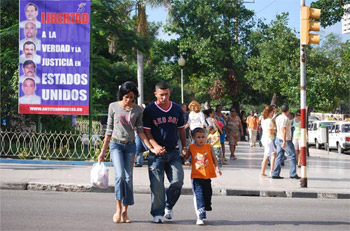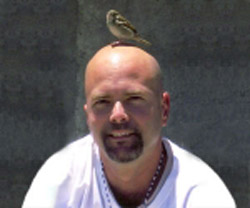The photos of the five Cuban agents are part of the island’s landscape. Photo: Raquel Perez
Apparently the prosecution and the judge played with cards up their sleeves by preventing the defense from having “access to all available evidence and documentary archives.” This was a violation of procedures so elementary that it even appears in TV series.
But the procedural mistakes don’t stop there. According to the UN rapporteur, the habeas corpus writ presented by the defense is being reviewed “by the same judge who was previously in charge of the case,” thereby making her the judge and the jury.
To top it all off, the hand of the US government can be seen in its pressuring of the courts for tougher sentences. Before and during the trial, several journalists in Miami received money to write articles against the five Cuban agents.
It really doesn’t seem legal for the executive branch to exert influence over the judiciary, nor is it very ethical for a journalist to agree to receive money from the government in exchange for writing articles to influence the outcome of an ongoing trial.
US attorney Martin Garbus says that between 1998-2001 an arsenal of propaganda was received by the Miami community through print, radio and television — paid for by the government — to interfere with the trail and to persuade the jury.
According to Garbus, fifteen journalists received money to write against the five agents. Apparently some received their funds secretly, with not even their media outlets knowing that they were working for another more generous employer. For this, one of the reporters was paid $175,000 USD.
The Office of Cuba Broadcasting (OCB) of the US government was forced to admit to the accusation when reporter Oscar Corral revealed that 50 of his colleagues in Florida were paid by government-funded Radio Marti for articles supporting the position of the US Department of State against Cuba.
The scandal was such that Jesus Diaz, the editor of the largest newspaper in Miami, fired several journalists claiming that the press can’t “ensure objectivity and integrity if any of our reporters receive monetary compensation from any entity, especially a government agency.”
The head of the Cuban agents, Gerardo Hernandez, was sentenced to two life sentences. Photo: Taken from Cubadebate
Despite the harsh words of the editor, this lack of ethics and professionalism seem not to have been considered too serious because a few months later several of those journalists returned to their old jobs, writing as if nothing had ever happened.
Certainly, there have been so many legal and ethical anomalies that make it seem logical for UN Rapporteur Gabriela Knaul to look askance at the independence of the judges in this case. Just the same, one would have expected such occurrences given the place where the trial was held.
Miami is a city where Cuban exiles have enormous political, economic and media power. It was highly unlikely to obtain a fair verdict in relation to these five agents who confessed to monitoring and reporting to Cuba on the activities of [terrorist figures] within that same community.
The atmosphere in Miami surpasses even their hatred of Fidel Castro and extends to citizens who live on the island. In the largest newspaper in the city diatribes appear ensuring that any relaxation of tensions “will have to be built by the submissive Cubans living on the island.”
The island’s residents are described as “those who have endured everything, who collaborated with everything, who have beaten Cuban dissidents, those who have betrayed their compatriots, who have tortured them, who have thrown them into the sea, and who have spent fifty years filling Fidel’s Revolution Square applauding and sniffing his ass.”
But it seems that the natural environment of that city wasn’t enough for Washington, so they decided that their official information apparatus would “burn up” hundreds of thousands of dollars to further inflame the situation and create a bonfire through the press.
In such an environment, Gerardo Hernandez was sentenced to two life sentences, ensuring that he would remain behind bars even if reincarnated in another life. Now his defense is demanding a fair trial in an unbiased city and without pressure from governmental or media campaigns.
The issue is worrisome even to the United Nations, because — as American lawyer Martin Garbus has expressed — “every dollar for every article, photo or radio or television program that was spent on this secret program violated the integrity of the trial.”
—–
(*) An authorized translation by Havana Times (from the Spanish original) published by BBC Mundo.


No comments:
Post a Comment